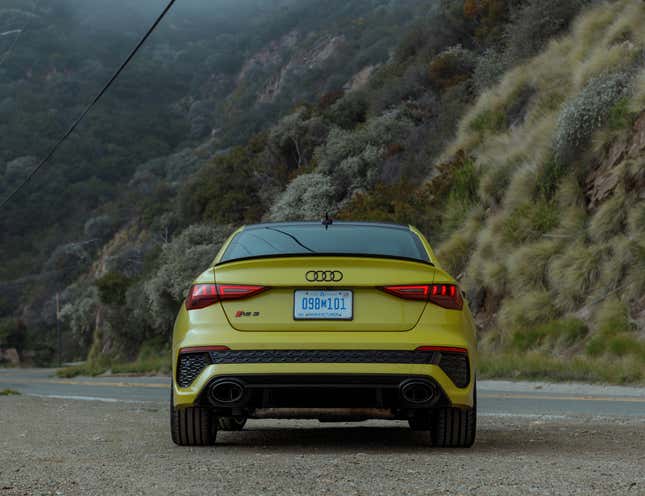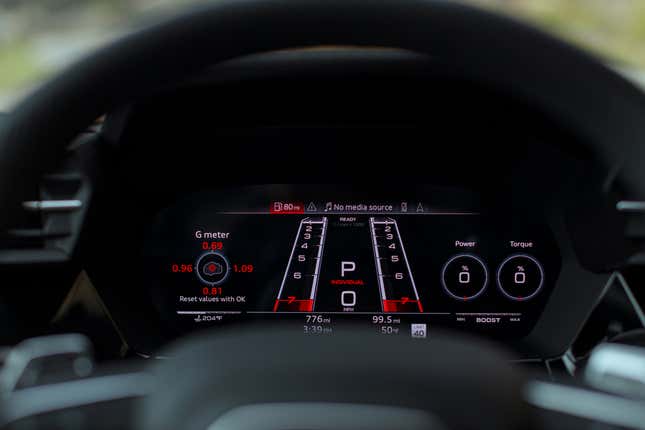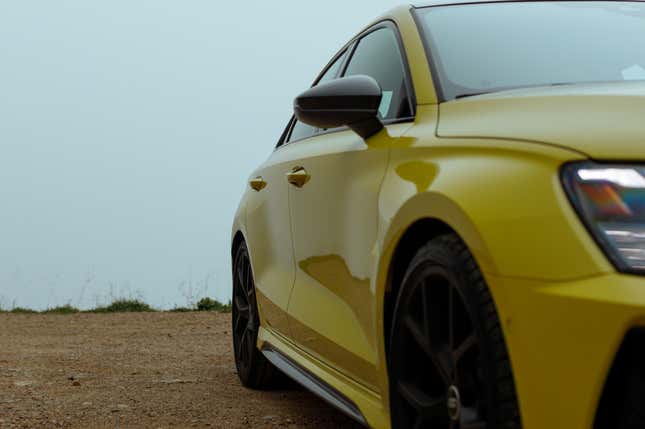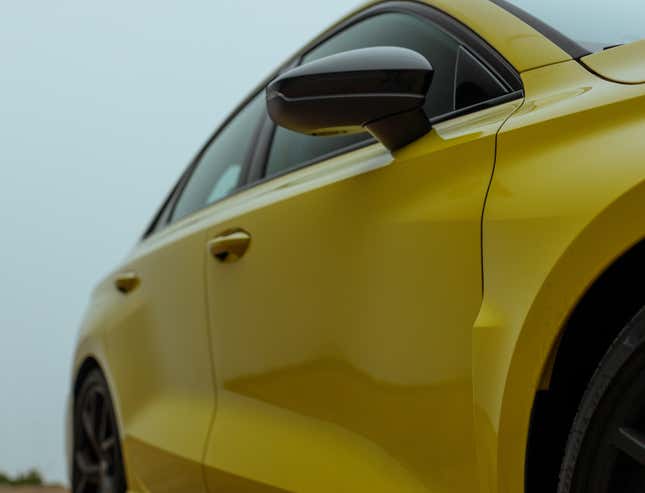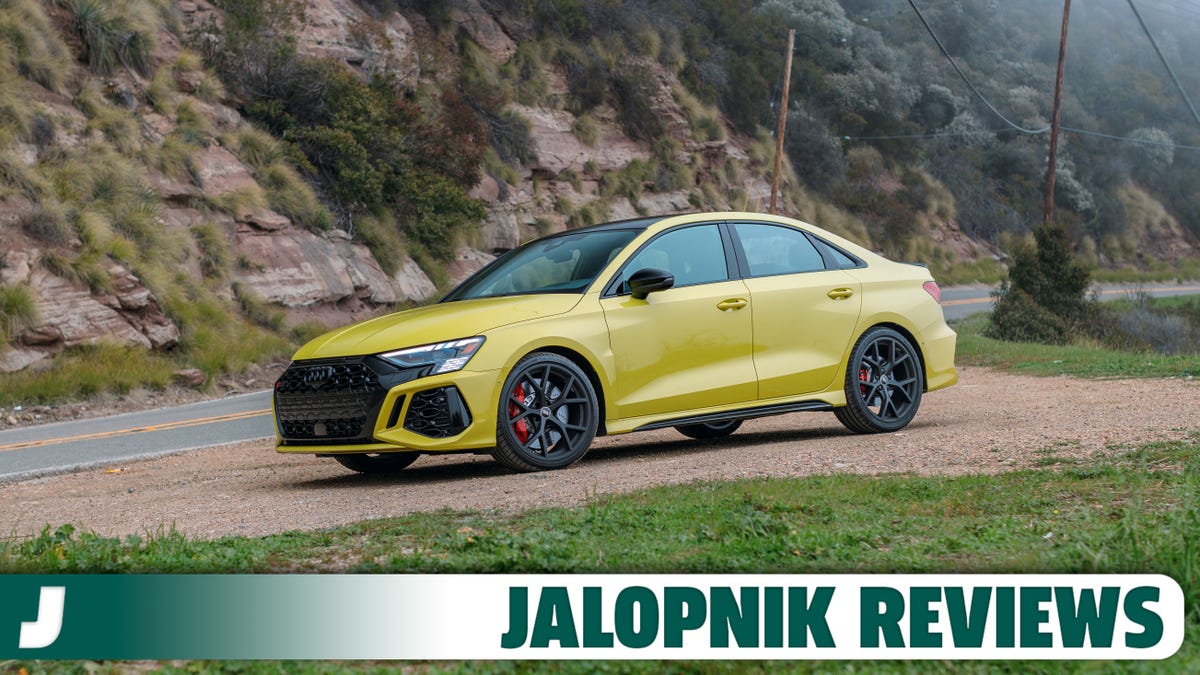At this point, nearly halfway through a decade in which electrification is accelerating at a rapid pace, most internal combustion engines are pretty similar configurations, especially when it comes to performance cars. There’s lots of single-turbo inline-fours, turbo’d six-cylinders, twin-turbo V8s that are usually four liters in displacement… And that’s about it, at least until you get into supercar territory.
There’s one car that bucks that trend, though, and it’s in a surprising segment. The Audi RS3 has a mega-powerful turbocharged inline-5 that’s one of the most characterful and interesting engines you can buy, made even more enjoyable by the fact that it’s in a compact sedan. In a world of great-yet-too-similar engines and EVs that best their performance figures, the RS3 stands out for the right reasons, making the case for internal combustion.
Full disclosure: Audi dropped off an RS3 at my apartment with a full tank of gas and let me drive it around for a week. My loan was earlier this year and I’ve had this review in my backlog, and am finally getting it published ahead of my first-drive of the updated 2025 RS3 that’s coming next weekend.
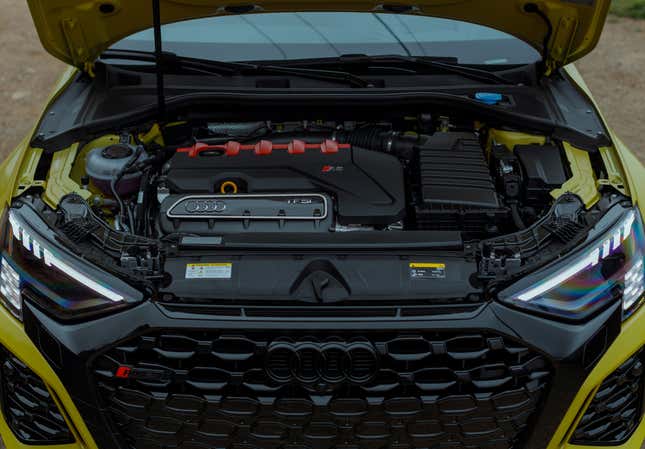
Audi has a long history of five-cylinder engines, and this particular motor has been around since the second generations of both TT RS and RS3. In the 2024 RS3 the turbocharged 2.5-liter inline-5 produces 401 horsepower and 369 pound-feet of torque, making it one of the most powerful compact cars ever made. That’s double the power of the standard A3, and an increase of 95 hp and 74 lb-ft over the four-cylinder S3. Audi pairs the five-cyl with a 7-speed dual-clutch automatic transmission mated to its Quattro all-wheel-drive system.
And my God, is it rapid. Audi says the RS3 will go from 0 to 60 mph in a mere 3.6 seconds, and even without using launch control that feels underrated. (Car And Driver got one to 60 in 3.3 seconds.) According to Audi’s numbers that makes it quicker to 60 than an RS5 coupe, and only a few tenths off an RS6 Avant. It’s not just quick from a stop, either. Floor it at 30 mph and the RS3 rockets forward with ferocity; do the same at highway speeds and you get EV-esque response and speed gains. Even in Comfort mode the RS3 promptly reacts to a squeeze of the right pedal. That quickness is a bit unexpected given how max torque doesn’t come in until 3,500 rpm, and max power isn’t reached until 6,500 rpm, 500 shy of the redline. Helping the RS3’s acceleration is the dual-clutch transmission that fires off punchy shifts, reacting quickly to throttle inputs and immediately downshifting even in the less-intense drive modes.
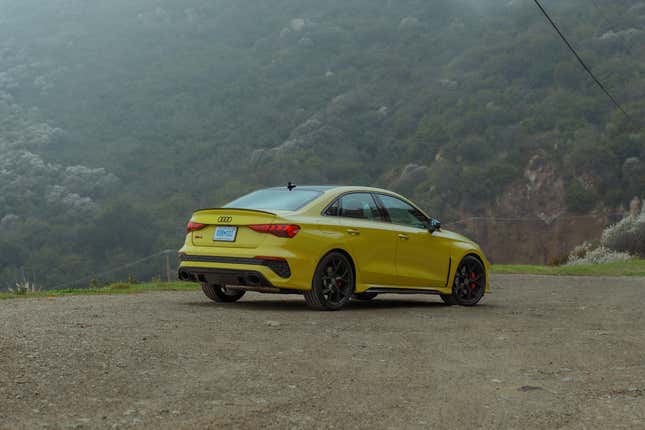
The five-cylinder engine feels more special to wring out than your typical turbocharged four-cylinders, and it sounds much more characterful to boot. My test car has the $1,000 RS sport exhaust system that makes the RS3 sound like a vintage rally car, emitting sharp barks and burbles with a pronounced warble at idle. It’s just begging to be driven hard, and it’s tough not to punch it from every stoplight.
Being an Audi, and a cheaper small one at that, the RS3 does have a tendency to understeer, but it’s a lot more fun to drive than most of its siblings. In most situations it stays neutral through corners, only starting to push when I really get on it. This is helped by a trick torque splitter at the rear driveshaft that uses a pair of multi-disc clutches to send up to 100 percent of the available torque (50 percent of the total) to either rear wheel as needed. Come into a corner too hot, and the RS3 is able to pull itself out of the apex with ease as it shuffles torque around. This isn’t a car that requires a delicate touch; it’s more of a steak knife than a scalpel, where the answer is usually to just use more power. It helps that the RS3’s steel brakes are great, with 6-piston calipers and 14.8-inch discs up front and single-piston calipers with 12.2-inch discs in the rear that provide a nice bite and barely any fade on a fast canyon run.
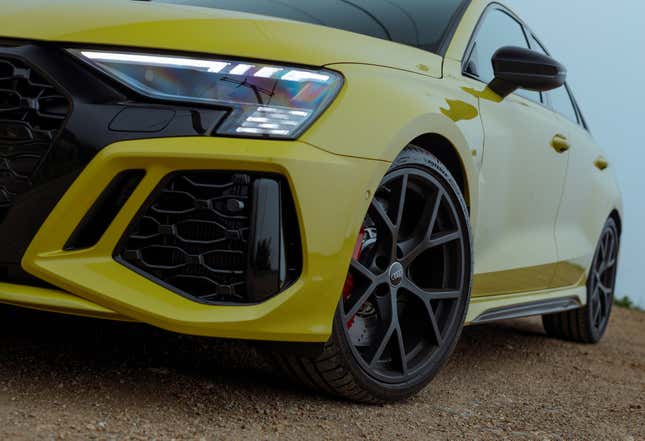
Its steering is quick and precise but too light for my tastes, a problem I have with most Audis. The Bridgestone Potenza summer tires on my test car provide a lot of grip while emitting nary a peep, and the RS3’s front track is wider than the rear, measuring 265/30 in the front and 245/35 out back. It also rides quite well, never getting unsettled even with the hydraulically adjustable dampers in Dynamic mode, though the softest setting is still pretty firm. Audi quotes a curb weight of
If you don’t want to rip around like a rally driver, the RS3’s Comfort mode makes it feel basically as comfortable and quiet as a normal A3, or you can put it in Dynamic for sportier everyday driving. A highly configurable Individual mode can be brought up with an RS button on the steering wheel, which can also toggle on the RS Performance mode that provides the most aggressive powertrain and chassis setup with a looser stability control tune. It’s less fussy than a lot of other cars’ performance modes, and clicking through each setting yields genuinely noticeable differences.
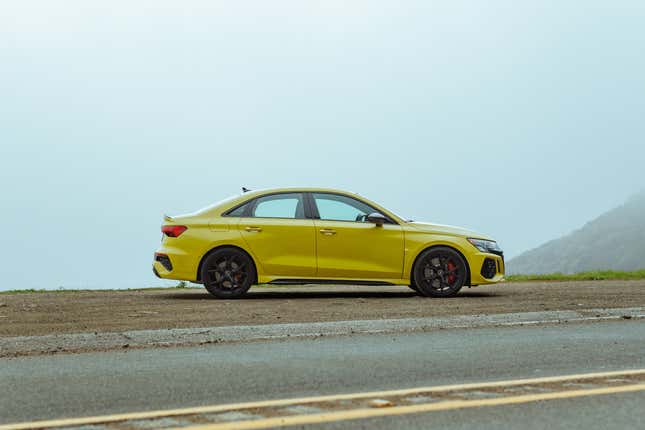
The RS3 looks properly cool, too. This generation of A3 sedan is already more muscular than the previous model, with the boxy flared fenders doing a lot of that work. The RS3 has an even better stance thanks to a 1.3-inch-wider front track and real vents added to the front fenders just ahead of the doors. The grille and front intakes are even bigger, the headlights have a sweet checkered flag motif, the side skirts are more pronounced, and the rear bumper has a full-width faux vent element above a diffuser that houses a giant oval exhaust tip on each side. You can even buy the RS3 in real colors, like the $595 Python Yellow of my test car or a searing no-cost Kyalami Green, and the $250 black is a nice accent.
It’s just too bad the interior isn’t as enticing. Sure, the front seats are aggressively bolstered, the perforated leather steering wheel is grippy, and there are plenty of suede and carbon-fiber accents, but there’s not much character. Audi’s angular interior design language has been growing on me, but finished in all black it’s just not an exciting place to be. (At least you can spec bright green or red stitching to liven it up.) I’m glad the RS3 doesn’t get the dual-screen MMI setup, relying on a 10.1-inch touchscreen with a couple rows of physical buttons for things like climate controls. Audi’s virtual cockpit 12.3-inch digital gauge cluster remains great, especially in the sporty drive modes where it gets race-inspired graphics, and both screens are able to show a lot of performance information.
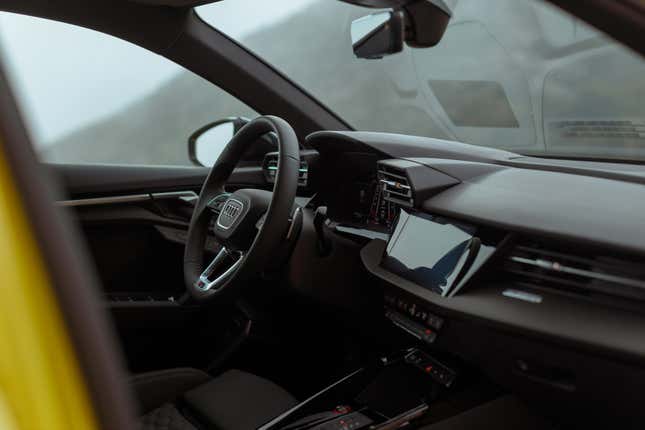
The 2024 RS3 starts at $63,395 including destination, a 63-percent increase from a base A3 sedan. That’s a lot of scratch for a compact car… Or is it? The cheapest BMW M2 is $66,075, the Cadillac CT4-V Blackwing starts at $62,890, and you can’t get a Mercedes-AMG CLA45 for less than $68,200 now that the S version is the only one available. With items like the $2,500 RS Technology package (navigation, a 3D Bang & Olufsen sound system, a head-up display and traffic sign recognition) and the $500 Black Optic Plus package (matte black wheels with summer tires and black badges and other accents) added on, my nearly-loaded RS3 test car came out to $68,590, quite a bit less than its competitors would be with all the boxes ticked.
If you can stomach spending that much on a Volkswagen Golf–based sedan, you won’t be disappointed. The RS3 is a special little car that stands out among its performance car peers, and it’s a dying breed. Following the death of the TT it’s the only Audi in the U.S. to use the inline-5, and there are no other brands producing five-cylinders. As Audi heads toward electrification we might not get a next-gen RS3 with this motor either, so we should be especially glad it still exists for now.
